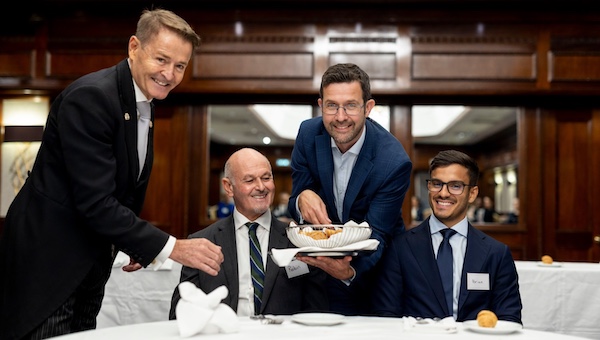
DAVID BYERS, SECOND FROM RIGHT, FUDGES SILVER SERVICE IN FRONT OF GARY WILLIAMS, FAR LEFT
THERE’S A GLOBAL SHORTAGE OF BUTLERS, CAN I MAKE THE CUT?
BY: DAVID BYERSORIGINAL SITE: THE TIMES
‘House managers’ can make more than £100,000, David Byers gets a lesson in etiquette from the British Butler Institute.
I’m standing in a function room at the luxurious St James’ Court hotel in central London, unsteadily holding aloft a basket of bread on a silver platter while being watched by 20 students in a semicircle.
Seated at a table near to me are two other students wearing the nametags Robin and Brian. They are pretending to be billionaires on a private jet, waiting for me to serve them lunch.
“What bread would you like?” I say, sidling up to them.
“Er, it’s ‘Good morning, sir,’” Gary Williams, the head of the British Butler Institute, sharply interjects. “And it is, ‘Would you care for bread, sir? We have white, brown and rye.’”
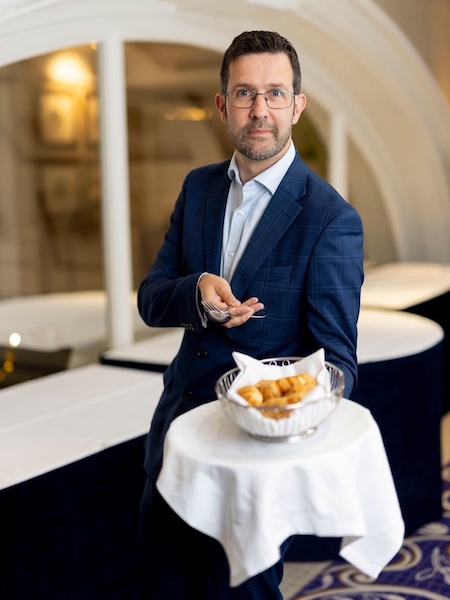
“Would you care for bread, sir?” - VICKI COUCHMAN FOR THE SUNDAY TIMES
I crouch down to get closer to my seated diners, and my tray bonks gently against Robin’s head. He looks mildly stunned but nonetheless asks for rye bread.
“Here you go,” I say.
“You mean ‘certainly’,” Williams whispers.
After fumbling with the tongs, which I am carrying incorrectly, I drop the bread on Robin’s plate from about a foot in the air. Someone giggles.
“Would you like some more?” I ask. Williams interrupts again, scolding me for using “more” (it implies greediness). “You just pause,” says Williams, “and wait.”
We wait for what seems an eternity. I stand, looking at Robin, and he looks up at me. Eventually, he asks for a white roll. “Yup.” I reply.
“It’s not ‘yup’, it’s ‘certainly’!” Williams hisses, irritably.
After a similarly cack-handed attempt at serving Brian, I beat a rapid retreat.
“That was shambolic,” I say to Williams. “It was shambolic,” he agrees. The students applaud patronisingly and I sit down to sip my coffee.
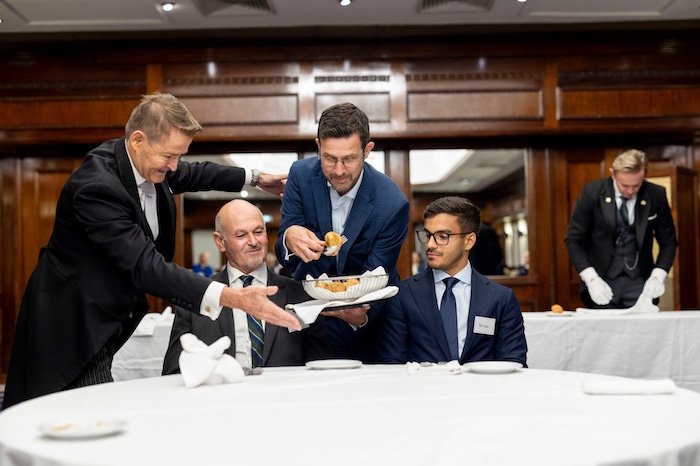
“I drop the bread on Robin’s plate from about a foot in the air. Someone giggles” - VICKI COUCHMAN FOR THE SUNDAY TIMES
By now, if I really had been on a private jet serving, say, the Duke of Westminster his lunch, I would have been dropped off at the nearest small Caribbean airport and sent back to Blighty pronto.
Luckily, unlike the students around me, I’m not seeking new employment. I’m here for the morning at a five-day silver service course at the British Butler Institute for purely journalistic reasons. A few months ago, a colleague had written about how owners of British country houses can’t get the staff — a story which featured a former Royal Navy officer who retrained as a butler. I suggested I sign up.
A national shortage of butlers — that very epitome of a first-world problem — has been caused by a triple whammy. First, in recent years, hundreds of multimillionaires and billionaires have arrived in luxury neighbourhoods in London, lured to this “safe haven” by its private schools and cultural attractions. Many then began to hunt for staff.
At the same time, the pandemic “race for space” led to large numbers of wealthy and fairly clueless British urbanites moving from cities into country estates with an urgent need for some help. And, almost simultaneously, there was the mass exodus of eastern European workers after Covid and Brexit, sharply trimming our stock of service staff to record lows.
• I had to fly a pony to St Tropez: inside the world of luxury concierges
For those looking to work in high-end service, all this presents an opportunity. Head butlers, the institute tells me, are frequently paid more than £100,000 a year, while a junior butler for a private household can expect £40,000.
It also means that the telephones at the British Butler Institute never stop ringing, as rich clients look for staff. The institute is the UK’s biggest butler training school, operating an array of accredited programmes ranging between three weeks to a single day under the tutelage of Gary Williams and his younger brother Sean. The classes are run at top London hotels and at numerous affiliated overseas training schools.
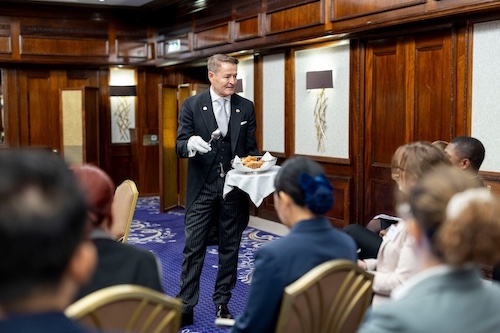
Williams stresses that language and ritual is everything in butlering - VICKI COUCHMAN FOR THE SUNDAY TIMES
Its courses cover an “incredibly diverse” range of skills. “We do a mixology course, a coffee barista course, a flower course and a cookery course. We have wine specialists come to do a talk, you have a guy who comes in and shows them exactly how to polish shoes.
“Our butlers are taught to pack suitcases, they can unpack suitcases, provide cigar services, they know all about champagne. You’ve got to get all the elements right before you present the dining experience. Little touches all along the line.
“We had a Greycoat Lumleys [the luxury domestic service agency] recruiter come in yesterday — they want all of our butlers.”
Some of the activities I witness during my session not only seem steeped in tradition but border on the ridiculous. Take “newspaper presentation”. Papers must, says Williams, always be presented unfolded to prevent creases, handed over longways with hands to the side to avoid smudging and, if possible, on a tray. Price tags must be removed too, unless that would risk tearing the paper.
“How else could we stop the ink from smudging?” Williams asks. “We iron the newspaper,” several members of the class reply.
Williams advises that, where possible, a butler should affix little tags [specially made with family crests] to sections that signpost the head of the household’s key interests: the sports pages mentioning their football team, for example, or the business pages for their investments.
Again, the language must be perfect. “I say, ‘As a matter of interest, I have highlighted the stocks and shares for you.’ As a matter of interest,” Williams repeats, correcting every student during role play.
• The super-rich escape plan: tunnels, seaplanes and farmland
I ask Williams whether this is all a tiny bit Jeeves and Wooster. After all, the super-rich — and particularly US tech billionaires, I’m guessing — might rely less on the printed word than they used to.
He replies: “Look, if one day there are no newspapers, so be it. But, if you are my client, then I’m going to want to know the perfect delivery service — just in case.”
Williams stresses that language and ritual is everything in butlering. “We’ve got phrases to use for just about every scenario,” he says, stressing the need to defuse confrontation. There are terms to use when speaking to “stealing guests, drunk guests, flirting guests, confidential information guests”.
“The simplest one is … let’s say I finished my wine … I put it down. A normal waiter comes along and says, ‘More wine, sir?’ That’s akin to accusing the client of being drunk. We just say, ‘Wine, sir.’ It makes no assumptions.”
Throughout the course, the students — at least two thirds of whom are from overseas — appear variously enthralled, amused and occasionally baffled.
Their reasons for choosing to enrol are hugely varied. The youngest participant is a Brit: Tom Stevenson, 18, has just finished his A-levels in west Berkshire and has joined us on the silver service course for a day before going to work at a yacht festival in Monaco at the start of his gap year. After returning he’ll take a cocktail mixology course before going to South Africa to work in a private retreat.
Then there’s Fen Rafael, 40, from Indonesia, who worked for the Norwegian fashion designer Espen Salberg for 13 years organising couture festivals and now wants to diversify into personal service.
Norbert Demeter, 55, a UK-based health and nutrition specialist, originally from Slovakia, wants to become a personal nutrition and fitness guru to a rich household.
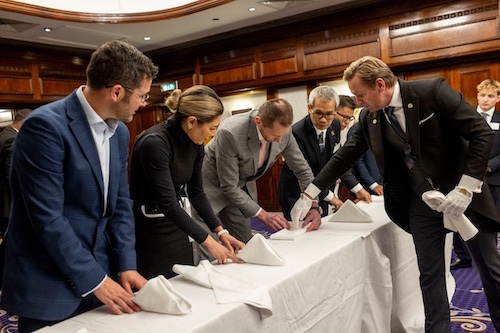
The session on how to fold a napkin - VICKI COUCHMAN FOR THE SUNDAY TIMES
Plus, there are people who, frankly, are already pretty advanced at butlering. Never Kapfuozaruura, a member of the service staff at the Angolan embassy in London, bamboozles other students at a napkin-folding session hosted by Sean Williams by creating pockets, fans, bread baskets, tuxedos, jackets and bow ties. He has come to the institute to brush up on his skills.
About a third of the students on this course are women. Part of this, I’m led to believe, is because conservative Middle Eastern wives prefer female staff, while the wives of the super-rich frequently want somebody to go shopping with. One female participant, Josy Piacente, 46, says she already works for “an ultra-high-net-worth individual” on her private jet and went on the course to delight her boss with her etiquette. “British standards are respected all over the world,” she explains.
Gary Williams has spent years turning his company into a global name. He has set up affiliate training programmes in Italy, Greece, China, Thailand, India, Singapore, the United Arab Emirates and Mexico, which provide staff for some of the world’s richest people and international brands, British and otherwise. Overall, these schools collectively churn out 3,450 graduates a year.
He and Sean will travel anywhere. “Only the other day I was in Cartier on Bond Street, training their team. I go to football stadiums, schools, Oxford University, cruise liners — anywhere people want great service. We have the largest contract in the world to train cruise liner staff. On Sunday I board the new boat Sun Princess in Southampton to train their top people. I co-judge the biggest fine service contest in Mexico.”
Some of the foreign aristocrats his butlers work for don’t even call them butlers — they are “retreat hosts” or “house managers” — but they are all taught to follow the same colonial-era patter because it makes clients feel special.
“One of our companies is Royal Caribbean [the American cruise line company]. Americans come to dinner in shorts and T-shirts, and what do we do to relax them? We deliver a beautiful service, a perfect service. And they love it. It makes them feel special. It provides a sense of occasion. It transcends nationalities.”
As I head off, apologising for my lamentable silver service skills, Williams is courteous to the end, inviting me for a final cup of tea. “You didn’t take up any of our time. The team loved you,” he says.
Charming, I think. Or, perhaps, another form of diplomatic language for a scenario when an incompetent journalist pays a visit to his company. There is, after all, a turn of phrase for every possible occasion.
AWFSM CATEGORIES
Activism | AI | Belief | Big Pharma | Conspiracy | Cult | Culture | Deep State | Economy | Education | Entertainment | Environment | Faith | Global | Government | Health | Hi Tech | Leadership | Politics | Prophecy | Science | Security | Social Climate | Universe | War
